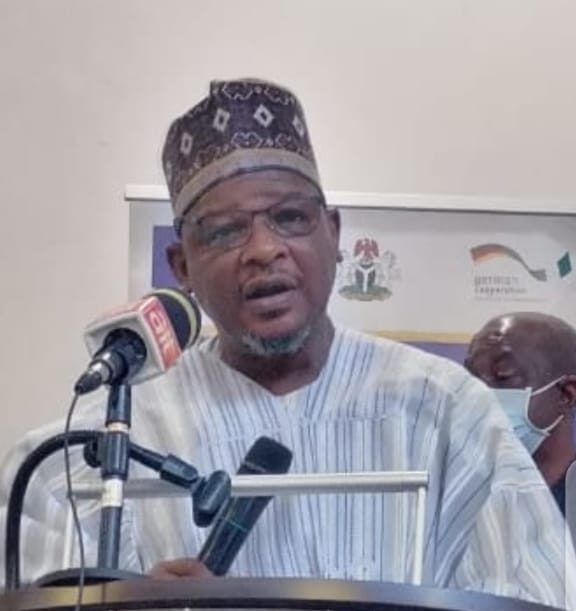FGN contracts 8 local solar firms to develop 23 mini-grids in 11 states
Story from Abah ADAH, Abuja
As part of efforts to increase access to electricity, especially in rural/off-grid communities and meet the country’s Vision 30:30:30 for the all-important amenity, the Federal Government of Nigeria (FGN) has signed Interconnected Mini-grid Acceleration Scheme (IMAS) award grant agreement with eight (8) indigenous Solar Mini-grid developers for the development of twenty-three (23) mini-grids across eleven states of the federation.
Expected to generate a 5.4-kilowatt peak to connect about 27,600 households, and impact over 138,000 Nigerians in two years, the €9.3 million projects is coordinated by the Rural Electrification Agency (REA) with support from the European Union and the German government through the Nigerian Energy Support Programme (NESP).
READ ALSO: Nigerian gov’t to broaden funding base for SMDF with establishment act
Speaking at the grant award signing ceremony, Minister of State, Power, Goddy Jedy-Agba, according to a statement made available by the ministry, said that he was pleased with the development which is geared towards achieving the country’s vision of generating at least, 30, 000 megawatts of electricity by 2030.
The Minister who commended the management of REA for their efforts and actions towards ensuring power reaches the off-grid communities in the country noted that the administration of President Muhammadu Buhari is always open to opportunities that will achieve the acceleration of electricity in Nigeria.
“According to the developed National Renewable Energy and Energy Efficiency Policy, the vision 30:30:30 aims at achieving 30,000 Mega Watts of electricity by the year 2030, with renewable energy contributing 30 per cent of the energy mix; to achieve this, Nigeria will have to construct over a thousand mini-grids of 100 Kilowatts,” he explained.
While admitting that government cannot achieve the target alone, he, however, said that it was important to continue to find creative and innovative ways to achieve it, one of which is through collaborating with development partners and the private sector.
“We understand that one of the major bottlenecks for the private sector’s involvement is financing, hence, the reason the NESP and REA have worked closely to develop and implement the Interconnected Mini-grid Acceleration Scheme.
The eight (8) local solar mini-grid developers, Acob Lighting Technology Limited, Gve Projects, Nayo Tropical Technology Limited, Rubitec Nigeria Limited, Darway Coast Nigeria Limited, Havenhill Synergy Limited, Sosa-Protergia Joint Development Company Limited, and A4&T Power Solutions Limited will receive in-kind grants through REA with support of the European Union and the German Government within the framework of the NESP.
These eight solar mini-grid developers will develop 23 mini-grids across eleven states which include, Zamfara, Niger, Plateau, Kwara, Kogi, Osun, Ogun, Lagos, Delta, Anambra, and Cross River, the indigenous developers”, he added.
Earlier, the Managing Director of REA, Engr Ahmad Salihijo Ahmad said that the scheme is aimed at bridging the funding gap which is affecting indigenous developers in the renewable energy sector.
Ahmad said: “It is our hope that the signatures we put down today in these documents set a precedent for the new and improved power and energy sector in Nigeria.
“As an agency, we encourage investors to explore the solar mini-grid sector. However, one major constraint to this is usually financing. This is why the Rural Electrification Agency, with the support of NESP, is working together to alleviate this bottleneck.
“We do this by providing in-kind grants to selected mini-grid developers on favourable and encouraging terms as contained in the Grant Agreement.
“The main objective of the intervention is to design and test a tender model for interconnected solar mini-grids, invariably leading to the foundation of the scheme. The wonderful thing about the IMAS project is that we have ensured that all the developers are Nigerians. This is to say that the Nigerian energy sector has come a long way from what it used to be and we are proud of this.”
Head of programme, NESP, Benjamin Duke assured that his team will continue to work to build investors confidence in the sector by developing an accurate electricity market intelligence that will provide investors with accurate data about the country’s electricity needs.
Follow the Neptune Prime channel on WhatsApp:
Do you have breaking news, interview request, opinion, suggestion, or want your event covered? Email us at neptuneprime2233@gmail.com





